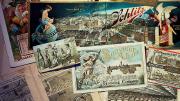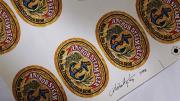Nearly eight years ago, Theresa McCulla ’04, Ph.D. ’17, crouched in the middle of Mass. Ave., collecting the set of chef’s knives that had fallen from its perch on the back of her bike.
She was on her way from her day job—coordinating Harvard University Dining Service’s Food Literacy Project—to an evening class at the Cambridge School of Culinary Arts in Porter Square, from which she later took a degree in the professional chef’s program. McCulla has since taken a new direction in her career, shifting from the preparation of food to the history of beverages. Now she oversees the American Brewing History Initiative at the National Museum of American History. Or as the headlines had it, when she was hired a year ago: McCulla is the Smithsonian’s “beer historian.”
The post fits in with her longstanding commitment: “asking big historical questions through the lens of food.” After earning her undergraduate degree in Romance studies, McCulla did a three-year stint as a French and Italian media analyst at the Central Intelligence Agency, while working nights—gratis, for experience—at a D.C.-area restaurant and for a pastry chef based out of a basement in Falls Church, Virginia. In 2007 she moved back to Cambridge, and applied to direct the Food Literacy Project (see Harvard Portrait, January-February 2010, page 43). “That got me back into the Harvard realm,” she says, “but all the while I was working there, I knew I wanted to transition back into academia.” She applied to and was accepted by the American Studies program, and wrote a dissertation (currently being adapted into a book) on the interplay between race and ethnicity and the food industry in nineteenth- and twentieth-century New Orleans.
This led pretty naturally into her work at the Smithsonian. “I’ve always been interested in how food and the material culture surrounding food—things like menus, recipe cards, cookbooks, even the packaging on souvenirs—convey ideas about race and ethnicity,” she explains. In that vein, she adds, traditional narratives about American brewing have excluded all but a select few: “I think for a lot of the beer-drinking public there’s this very familiar history of companies like Anheuser-Busch, and immigrant German men who came to America in the mid nineteenth century. And while it’s very true they made brewing a profession, up until then brewing in America had always been a domestic task. It was done by women, and especially in the nineteenth century and before that it was often the work of enslaved people.”
McCulla’s prime focus, however, is on the renaissance of do-it-yourself brewing culture, and the boom in craft brewing that began in the 1960s and ’70s. Developing this archive entails research trips to meet the brewers and hops-growers, the old guard and the present-day innovators, who helped create the craft-beer industry we know today—and, of course, asking for objects and documents they’d be willing to contribute to the museum’s collection. Last year, for example, she visited Northern California, the cradle of the American craft-beer surge, where companies like Anchor and Sierra Nevada helped revitalize brewing culture. She conducted oral-history interviews with figures such as Michael Lewis, an emeritus professor of brewing science at UC Davis who brought the academic discipline to the States in the 1960s. During a later trip to central Colorado, she spoke with Charlie Papazian, the godfather of American homebrewing (“If you brew at home, you have his books on your shelves”) and also sat down with Twila Soles, an artisan maltstress providing gluten-free grains like oats to regional operations.
Conducting such interviews underscores a central challenge of her beer-history research—namely, its recentness. “It’s been a new experience for me as a historian,” says McCulla. “How do you work with people who are still very much in the midst of their careers? How do you get them to think about their life stories as historical?”
Similarly, her work brings her into contact with objects that might not, at first blush, strike the layman as having obvious historical importance. Seemingly mundane documents, like business records or bulletins circulated among homebrew clubs before the rise of the Internet, are “really a kind of goldmine for a historian who wants to look back and see who’s talking to whom and what kinds of ideas are being exchanged.”
A single dated entry can contain the germ of a massive cultural shift, spotlighting, for instance, the shift in Americans’ interest from light lager beers to porters and stouts and other new formats. “What newsletters and brewing logs are recording is kind of an evolution in taste,” McCulla explains. “If you’re able to look at a log and say, ‘Oh, this is the first time this person brewed this kind of beer,’ what that really tracks is a new taste for the American consumer.”
Correction: The original text referred to spelt as a gluten-free grain. It is not, and the article has been updated accordingly. We regret the error.











